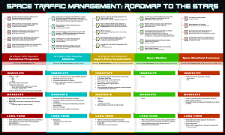Location
Jim Henderson Welcome Center, Embry-Riddle Aeronautical University - Daytona Beach
Start Date
5-11-2014 10:30 AM
Abstract
The management of space traffic begins with the integration of space launch and re-entry activities into the multi-modal environment of surface transportation. Most of the discussion and conceptual development of space transportation management to date has been focused on the integration of commercial space transportation into the National Airspace System (NAS). But there is also a need for spaceport site planning and operating concepts that effectively and safely integrate commercial space launch and re-entry into the established transportation infrastructure of various surface systems -- highways, railways, and waterways. The market demand for exclusively commercial spaceport capacity to meet the schedule and service requirements of private and other non-government launch customers is pushing launch site selection into new locations separated from the secured boundaries of existing federal launch installations. As a result, new spaceport operating concepts and procedures will be required to integrate space transportation into these new sites and the surface transportation networks existing in the launch area. This paper uses the proposed Shiloh Launch Complex and other examples to present site development and operating concepts for integrating space launch traffic with surface transportation.
Area of Interest
NAS Integration

Space Traffic Management and Surface Transportation: Operating Concepts for Commercial Spaceports
Jim Henderson Welcome Center, Embry-Riddle Aeronautical University - Daytona Beach
The management of space traffic begins with the integration of space launch and re-entry activities into the multi-modal environment of surface transportation. Most of the discussion and conceptual development of space transportation management to date has been focused on the integration of commercial space transportation into the National Airspace System (NAS). But there is also a need for spaceport site planning and operating concepts that effectively and safely integrate commercial space launch and re-entry into the established transportation infrastructure of various surface systems -- highways, railways, and waterways. The market demand for exclusively commercial spaceport capacity to meet the schedule and service requirements of private and other non-government launch customers is pushing launch site selection into new locations separated from the secured boundaries of existing federal launch installations. As a result, new spaceport operating concepts and procedures will be required to integrate space transportation into these new sites and the surface transportation networks existing in the launch area. This paper uses the proposed Shiloh Launch Complex and other examples to present site development and operating concepts for integrating space launch traffic with surface transportation.


Comments
Click here for Jim Ball’s Bio Page